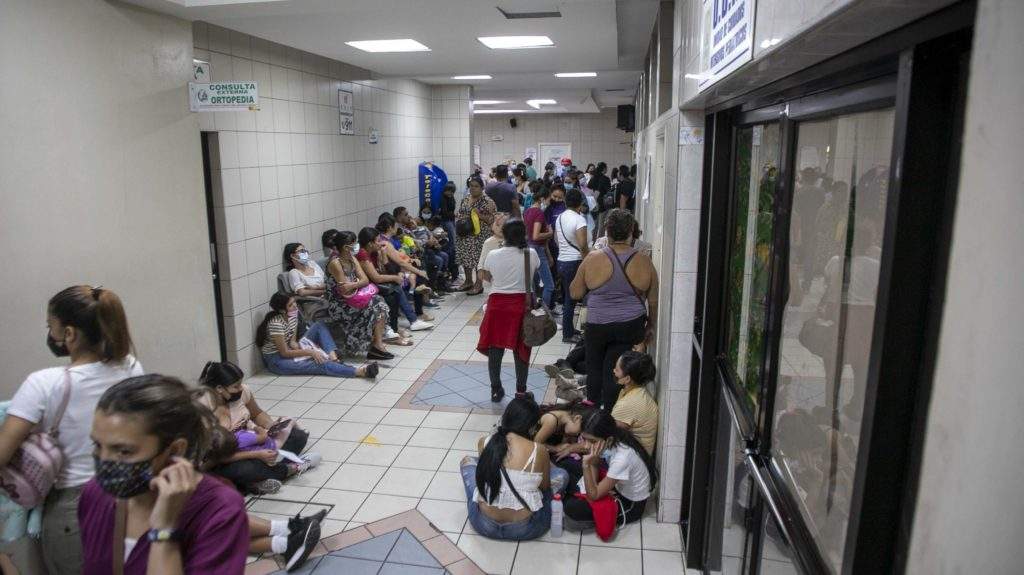The newly appointed director of the Honduran Social Security Institute (IHSS) and the secretary of health refuse to issue statements about the ongoing social security crisis, denunciations of corruption or a recent decision to release millions of lempiras in funds, arguing that it is not their responsibility to do so. But others are speaking up: patients, who have been mistreated and don’t have access to medicine, and civil society groups and doctors, who are concerned about the future of a collapsing health care system and expect new legislation and transparent investments.
Text: Célia Pousset
Photography: Fernando Destephen
Saraí and her six-year-old daughter, Alejandra, were waiting on the sidewalk in front of IHSS in La Granja, Tegucigalpa. Alejandra underwent surgery on her throat one week prior and was going to see a pediatrician for a check-up. It was 2 p.m. on a hot day in mid-June. “Doctors are seeing patient number 50 right now, and I’m 112 on the list,” said Saraí, who had left the waiting room for fear of overcrowding and getting infected with dengue.
Air conditioning doesn’t work because the entire system is being repaired, and the halls are overcrowded with patients, some of whom have to stand or sit on the floor while waiting for their turn. “It is hard to breathe inside, and my daughter has a problem in her throat,” commented Saraí, “Have you seen all of those children? They say most of them have developed symptoms of dengue.”
The Epidemiology Bulletin No. 27 reported that 49,201 people have recovered from dengue, 8,244 people could be infected, and 98 people have a severe infection. An already overburdened health care system is taking in hundreds of patients each day. A nationwide surge in dengue cases has added to the management crisis at IHSS, which has been led by three directors in two years. In late May, Dr Carlos Aguilar resigned as director over the lack of support for his projects and the existence of payroll padding at the hospital in San Pedro Sula.
What is behind so much instability? Why is it that the problems that have been affecting the IHSS for years keep recurring despite reforms and new leadership? Who suffers the most for the chronic incompetence of the health care system?
A deeply-rooted problem: IHSS’s management
We met with Ligia Ramos – a dermatologist who has worked for 19 years at IHSS and independent congressional representative who was previously a member of the Salvador de Honduras Party – in her practice in Barrio Abajo, Tegucigalpa. She said she saw some 30 patients in the morning and was tired. She admits that IHSS faces a new period of uncertainty: “We are very worried about the mismanagement. The board of directors, whose members have no technical knowledge of the challenges the institution is facing, has obstructed work done by the executive director.”
Such concerns are not recent. Dr Aguilar and Adriana Zúniga, both former directors, publicly denounced that the board – IHSS’s highest authority, which is comprised of two representatives from the Secretariat of Health and the Secretariat of Labor, three from the Honduran Private Enterprise Council (COHEP), three from the Workers Confederation and one from the College of Doctors – has squandered money in travel and food expenses, and lacks vision to improve the system.
In a telephone interview, Zúniga anticipated that “as long as there are no changes in governance, social security will not improve.” She further denounced the “political and gender violence” she lived through as director at age 37. “Leading the institution [IHSS] in a country with so much inequality was my goal for a long time. I thought the changes the country urgently needed would take place, but I was naive. I lived through a series of events that were not revealed to the public,” she said.
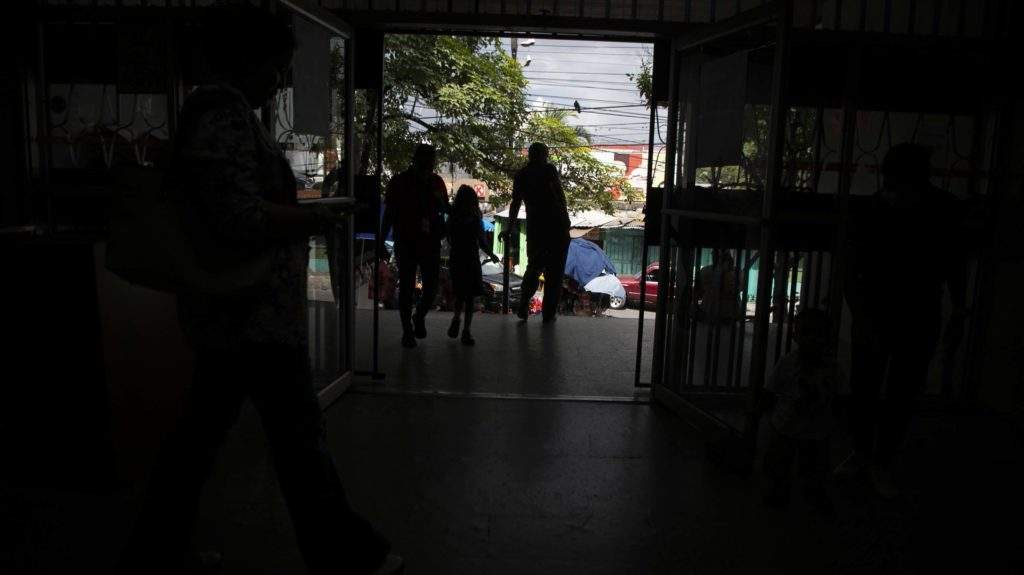
“IHSS manages a budget upwards of 55 billion lempiras [as of 2022], but over the years it has been involved in campaign financing and other irregularities, including payroll padding. Management and decision-making are the problem,” explained Zúniga, who gave an example of the constraints she faced as director: receiving proposals from public officials who wanted “certain benefits in order to influence the institution.”
Ricardo Rodas Márquez, president of IHSS’s Association of Doctors, says the board of directors are also a problem: “The State has always favored private enterprise, and this is reflected in governance. It is inconceivable to me that COHEP has not looked after the interests of its employees, who are also beneficiaries of social security.” The lack of social commitment reduces the quality of medical services, and Dr Rodas Márquez is aware of many deficiencies within the institution: there are 1,100 doctors assigned to Tegucigalpa and San Pedro Sula, but specialists, surgeons, oncologists and other personnel are needed.
The construction of an oncological center in Tegucigalpa was one of projects promoted by Dr Aguilar, and one which is “necessary,” according to Dr Rodas Márquez, who also calls for the construction of a regional hospital in San Pedro Sula (since “the current one used to be a motel”) and La Ceiba, the expansion of operating rooms and the acquisition of new radiology equipment.
“IHSS is managed by Honduras’ economic elite” and governance is therefore unbalanced. COHEP would send three representatives and three surrogates to the board’s meetings. What was their aim? To demand money for hotels, food and other expenses,” said Zúniga.
We attempted to interview the current IHSS director, Yadira Álvarez, to know about her vision of the institution and projects that will be carried out, but the IHSS’s spokesperson said she needs the approval of the board and would not issue statements at the moment. In like manner, we contacted Gustavo Sólorzano, COHEP’s legal counseling manager, to discuss IHSS from the board’s perspective. But he didn’t grant Contracorriente an interview, even though he had initially agreed to one.
The ghosts of corruption
Before resigning, Dr Aguilar denounced the existence of payroll padding at the hospital in San Pedro Sula, which is being investigated by the Attorney General’s Office. This came as no surprise to Dr Rodas Márquez because “it was something he suspected.” He said there were many irregularities on the 10th floor of the IHSS in Tegucigalpa, where the centralized management works.
“We saw many strangers who would leave in a very good mood. We thought they were hiring more people, but we never saw them again. We assumed they would work in San Pedro Sula, but, despite the rumors, we could not be certain. Dr Aguilar set an example by denouncing these acts of corruption,” Dr Rodas Márquez said.
One day after Dr Aguilar’s resignation, the government announced in a decree published in the official gazette that the National Assembly had released 3.6 billion lempiras in contributions and raised the limit of contributions to social security. According to the decree, the funds would be destined for the improvement of health services, and IHSS should establish an “investment plan” of saved funds. The plan will be evaluated and monitored by a special commission, and overseen by the Secretariat of Transparency and Fight against Corruption and the Secretariat of Health. Given the previous cases of embezzlement in IHSS, fund management is under scrutiny.
“As a congresswoman, I feel responsible for approving the release of the funds, which are necessary and ought to be invested in infrastructure because we are stretched thin. I have to keep a close eye on how those funds will be expended,” Ramos said.
She regrets that the funds will be monitored by the Secretariats of Health and Transparency. Regarding the former, she pointed out “a conflict of interest” because it is part of IHSS’s board of directors, and noted that the latter has “lost credibility” in the fight against corruption since the resignation of former Secretary Edmundo Orellana.
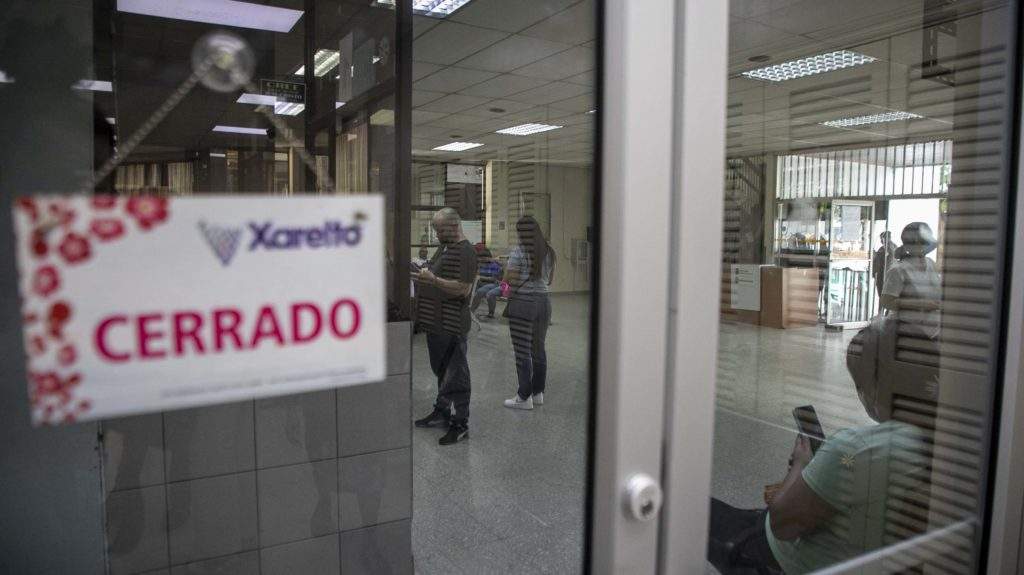
Ramos also said it is necessary to create a special commission within the National Assembly that investigates what is happening at IHSS. We asked Wilfredo Sabio, congressman from the Libre Party and president of the Health Commission, if it is feasible, and said it is up to the Attorney General’s Office to conduct that investigation. However, he is concerned about the situation at IHSS and looks forward to the new Social Security Law (Ley de Protección Especial), which the executive branch is drafting.
In April 2022, the Social Security Legal Framework (Ley Marco del Sistema de Protección Social) was declared unconstitutional by the Supreme Court arguing that it compromises the rights of citizens by privatizing and outsourcing health services. According to Sabio, the new law will expand social security coverage to people who hold informal jobs, and should be aimed at merging public health care and social security into universal health care.
“IHSS has not fully recovered from the corruption that occurred in recent years, especially under the Lobo Sosa government. There is popular demand around the country, and it is imperative to correctly define which projects will be carried out. At the National Assembly we decided to release 3.6 billion lempiras that had been collected since the repeal of the Ley Marco in 2022 as a provisional measure,” Sabio explained.
Outside of Tegucigalpa and San Pedro Sula, insured patients must go to private clinics that have agreements with IHSS. Outsourcing health services has caused many problems, including a public health emergency in La Ceiba, northern Honduras. This happened after Hospicentro Okens stopped seeing patients, demanding payments and better conditions of the contract.
The recurrent unavailability of treatment for chronic diseases
Deficiencies in the health care system harm some sectors of the population more than others, and one group of patients severely affected is in need of more constant treatment.
In 2015, IHSS’s embezzlement case outraged thousands of Hondurans (known as Movimiento de los Indignados, or “The Outraged”) who took to the streets demanding President Juan Orlando Hernández’s resignation over the funneling of $300 million into his 2013 presidential campaign. The population demanded the installation of an international investigative commission like the CICIH in Guatemala – a promise from the Castro government that remains unfulfilled.
At the hospital in La Granja, Tegucigalpa, the head of the pharmacy said there were no problems with the supply of medicine. “The medicine supply rate is 80 percent, which is quite good,” she said confidently. However, when asked what medications make up the remaining 20 percent, she said drugs used to treat cancer and chronic diseases, which are “very expensive.”
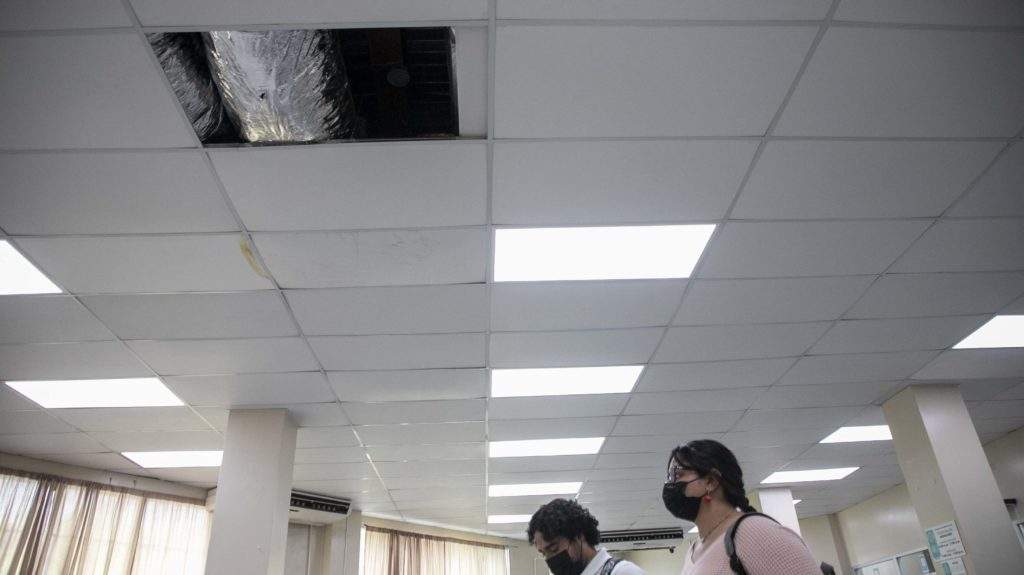
IHSS directly purchases medication, but if the ceiling of 300,000 lempiras is exceeded, the process is conducted by means of a public bidding, which has been managed by the United Nations Office for Project Services (UNOPS) since 2014. “When we run out of medication, sometimes we wait a month or two and are unable to provide some treatments,” the head of pharmacy said.
The Honduran Network of Patient Associations (Red Hondureña de Asociaciones de Pacientes – REHAP) considers that the problem at IHSS is more serious. In late June, they warned in a press conference that patients with chronic diseases would not receive any more treatment because the biddings were not made on time. In addition, the lack of equipment to take mammograms, MRI scans and ultrasounds prevents them from detecting and monitoring chronic and degenerative diseases.
Dr Rodas Márquez said there is only one person taking CT scans in Tegucigalpa.
“Annual purchases are not properly planned. If biddings are not done on time, our treatment is suspended for up to four months, and when there is no medication, we suffer a relapse, which can lead to an impairment or even death,” said Ingrid Soto, spokesperson for REHAP and a patient diagnosed with multiple sclerosis. Not all biddings for this year’s medication have been made and the hospital is therefore on high alert, she added.
“Why do biddings fail in Honduras? Why do pharmaceutical companies jointly decide not to make offers or to boycott biddings? Their strategy is to ensure that legal requirements are not met so that all biddings are dismissed, forcing IHSS to pay for treatment directly, which is more expensive,” said Adriana Zúniga, former IHSS director.
According to a management performance report by IHSS, in 2014, providers did not participate in IHSS’s public biddings due to the debts, which amount to millions of lempiras, the institution owed to pharmaceutical wholesalers. That year, medication was purchased through UNOPS for the first time.
However, Zúniga said that mechanism doesn’t work either: “IHSS pays UNOPS millions of lempiras, but it only guarantees a medical supply rate between 30 and 37 percent. It’s like paying a reseller to do the job, but IHSS ends up paying more.”
Contracorriente requested interviews and sent emails with specific questions about the supply rate to UNOPS, but they did not respond.
Care provided by IHSS to patients with HIV is insufficient. Rosa González – director of Llaves, an organization that supports people living with HIV – said, “Many patients prefer public health care over social security because, despite its limitations, the former ensures more continuity when providing treatment.” She recalls that in 2015, in the aftermath of the embezzlement, the health of many patients with HIV worsened since the virus harms the nervous system if not treated with medication.
González stressed IHSS management’s lack of credibility and its impact on the lives of patients. She considers it would be difficult for civil society “to bring changes to IHSS because there are many interests at play.” “IHSS has lurched from crisis to crisis, and I think civil society, which has protested against corruption over the years, is tired. There is a private enterprise structure that uses its power to weaken IHSS and further privatize health services.”
“We deserve to be treated better; the cost of insurance is deducted from every worker’s salary.”
IHSS’s hospital in San Pedro Sula, northern Honduras, faces complaints of corruption and mistreatment of patients. In addition to the payroll padding denounced by Aguilar, there isn’t sufficient personnel.
Teresa (her real name will not be disclosed to protect her identity) contacted Contracorriente to denounce an event that occurred at the IHSS hospital in San Pedro Sula in April 2024. Like many testimonies we have heard, it’s evident she needs an outlet to lift the burden of so many emotions. She was anguished by the fear of losing her nine-year-old daughter, who had caught pneumonia, in the midst of medical negligence and derisive remarks for having autism.
After diagnosing her daughter with pneumonia at a private clinic in San Pedro Sula, doctors ordered that she be hospitalized, but since she didn’t have the financial means to do so, she took her to IHSS. “My daughter had a high fever and chest pain. We waited from 1 p.m. to 7 p.m. The waiting room was full, there were no benches for her to lie down and she was shaking. There was vomit and phlegm on the floor, so I just stood there and held my daughter in my arms,” Teresa said.
When a doctor finally examined her daughter, he bluntly denied the diagnosis, but Teresa repeated what the doctors had said about the hemogram. They returned to the waiting room. Teresa was afraid her daughter would convulse. At 9 p.m. the doctor finally acknowledged Teresa’s daughter had pneumonia and was hospitalized.
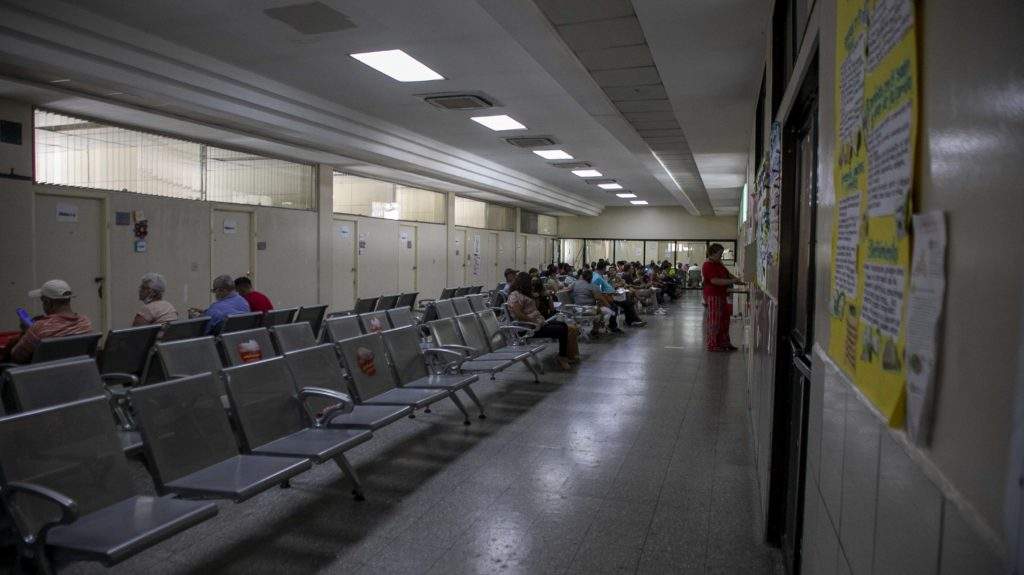
That was the worst evening of her life. “They did not give her serum, did not check on her and just left her on a stretcher. I put a damp cloth on her forehead because I didn’t know what to do. All of a sudden, a nurse unplugged the heart rate monitor, and when I asked why, she scolded me. She then removed the blanket, and when the other nurse came in, she told me: ‘Do you want her to die? Why isn’t she covered with a blanket?’ I felt humiliated.”
“I explained to one of the doctors that my daughter and I have autism, but she simply said, ‘Everyone has autism nowadays, including myself.’ It’s unbelievable that IHSS personnel blame patients for their illnesses and look down on us because of our health conditions,” Teresa said.
Teresa’s experience is yet another example of unsolved structural problems at IHSS: hospitals operating above their capacity, shortage of medical specialists, difficulty obtaining a diagnosis, shortage of medication and lack of training in assisting neurodivergent patients.
Contracorriente attempted to interview Secretary of Health Carla Paredes to discuss IHSS, but she said she would accept questions in writing.
We inquired thus: “What is the Secretariat’s perspective on IHSS’s management crisis and the “lack of support” denounced by former directors? What is the outlook for IHSS and is there a possibility to provide public health care to workers? Is a reform of management being considered? What actions and investments can be carried out with the 3.6 billion lempiras released by the National Assembly? What are the causes of the shortage of medicine used to treat chronic illnesses?”
They responded, “We consider that IHSS should address those questions.”
However, the Secretariat of Health is part of IHSS’s board of directors and the Special Commission that, along with the Secretariat of Transparency and Fight against Corruption, oversee the expenditure of the funds released by the National Assembly. We pressed the Secretariat, but they didn’t provide additional information.
According to the 2022 Human Development Report by the United Nations Development Programme (UNDP), Honduras’ health care system is broken and a large investment is needed to transition into universal health care. Experts estimate that 0.656 percent of the GDP ($163.5 million) must be invested annually in order to guarantee universal health care.
In 2024, the Castro government budgeted 29.1 million lempiras for the Secretariat of Health and, in sharp contrast, more than 11 billion lempiras for the Secretariat of Security.
***
A woman and her daughter sat on the sidewalk outside of the hospital in La Granja where Saraí and Alejandra had been waiting. It’s a waiting room for those who cannot find a seat or avoid overcrowded places. The woman gave a slice of pizza to her daughter, who started crying.
“She doesn’t eat anything,” the mother lamented. She is worried about her daughter’s loss of appetite which is why she decided to seek urgent pediatric care for her. Rocío Morena, head of public relations at IHSS in La Granja, said, “Pediatricians only see patients who need emergency medical care, and psychological problems are not considered an emergency.”
However, the woman and her daughter have nowhere else to go. They will stay and wait.

